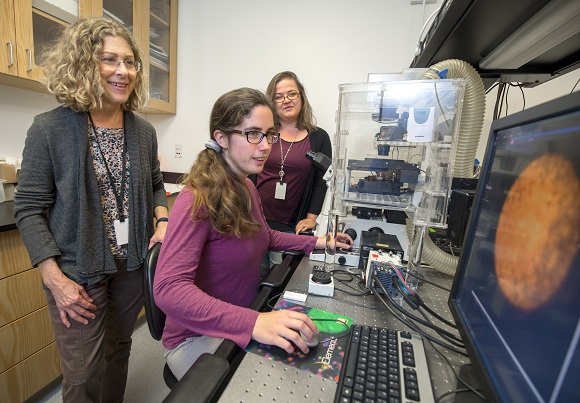DISCLAIMER
The information and materials accessed through or made available for use on any of our Sites, including, any information about diseases, conditions, treatments, or medicines, are for informational purposes only. The Content is not intended to be and is not a substitute for professional medical advice, diagnosis, or treatment, and your participation on our Sites does not create a healthcare professional-patient relationship. You should consult a doctor or other qualified health care professional regarding any questions you have about your health or before making any decisions related to your health or wellness. Call your doctor or 911 immediately if you think you may have a medical emergency.compose your message
message sent
email sent successfully
Trusted Resources: News & Events
Latest announcements and gatherings
Healthy red blood cells owe their shape to muscle-like structures
Red blood cells are on a wild ride. As they race through the body to deliver oxygen, they must maintain a distinct dimpled shape—and bounce back into form even after squishing through narrow capillaries. Red blood cells that can’t keep their shape are associated with diseases like sickle cell anemia.
In a new study, Velia Fowler, PhD, and her lab at The Scripps Research Institute report that a protein called myosin IIA contracts to give red blood cells their distinctive shape. The findings, published this week in the journal Proceedings of the National Academy of Sciences, could shed light on sickle cell diseases and other disorders where red blood cells are deformed.

 +myBinder
+myBinderRelated Content
-
people & placesRed Cell Pain Management Service at St George’s HospitalPeople with sickle cell disease can ofte...
-
people & placesLakshmanan Krishnamurti, MDDr. Krishnamurti graduated from the Arme...
-
education & researchOutcomes of an Emergency Department Observation Unit–Based Pathway for the Treatment of Uncomplicated Vaso-Occlusi...Study objective: This was a prospective...
-
people & placesAllison A. King, MD, MPH, PhDDr. King is a pediatric hematologist and...
-
Community CenterSickle Cell Patients Endure Discrimination, Poor Care And Shortened LivesFor more than a year, NeDina Brocks-Capl...
-
education & researchSickle Cell Disease – Tips for Healthy LivingIt is very important that every person o...
-
news & eventsSpearheading change on World Sickle Cell DayThis year on World Sickle Cell Day, a ne...
send a message
To improve your experience on this site, we use cookies. This includes cookies essential for the basic functioning of our website, cookies for analytics purposes, and cookies enabling us to personalize site content. By clicking on 'Accept' or any content on this site, you agree that cookies can be placed. You may adjust your browser's cookie settings to suit your preferences. More Information
The cookie settings on this website are set to "allow cookies" to give you the best browsing experience possible. If you continue to use this website without changing your cookie settings or you click "Accept" below then you are consenting to this.
Support for this site is provided by

This platform is made possible through a partnership with the Sickle Cell Disease Association of America, Inc. (SCDAA) and its member organizations. SCDAA's mission is to advocate for people affected by sickle cell conditions and empower community-based organizations to maximize quality of life and raise public consciousness while advancing the search for a universal cure.




